Diane Hypatia


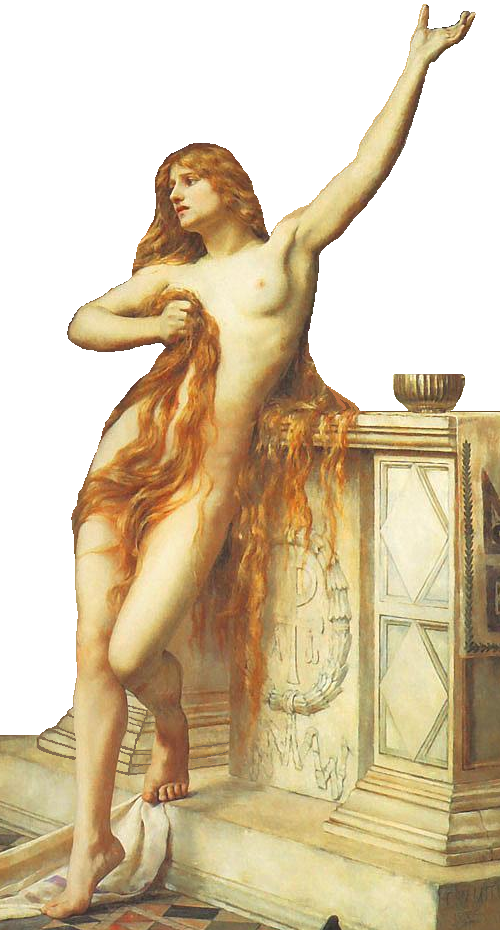
(hypatia19.png)

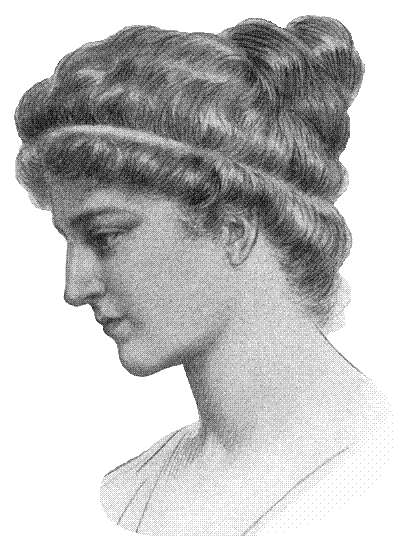
(hypatia2.gif)

(hypatia12.png)
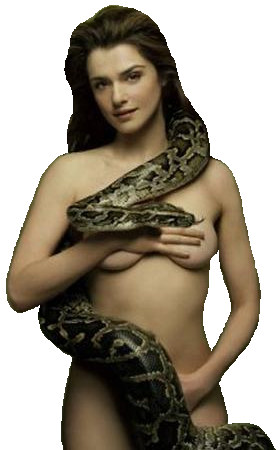
(meringuebg.gif+spacer.gif)

Kato, how come you place my name right beside Hypatia?

Oh ... Diane, do you know who Hypatia is?
Yes, of course, I know. She is a Greek philosopher renowned for her beauty, isn't she?
Oh ..., ma ma mia ... ooh la la ... What an astounding jack-in-the-box!
Kato, what makes you so flabbergasted?
You know, Diane, not many people go to church these days.
I know. I know. But I don't blame them.
Why not?
...'Cause there are so many diversions people are occupied with. Going to movies is more exciting than going to church. Sitting in front of the computer screen is much more fun than sitting on a hard bench in the church.
So, Diane, you don't blame me for not going to church nor going to Buddhist temple, do you?
No, I don't. But why are you talking about church?
Well ... you know, Hypatia was killed by a Christian mob. Since you're a devoted Christian and regular church-goer, you might have known the tragic incidents in the early history of Christianity---the murder of Hypatia, in particular. That's what I thought.
I see..., but, Kato, you aren't a Christian, are you? How on earth have you come to know Hypatia?
Well ...I borrowed a DVD called "Agora" from Vancouver Public Library.

(lib30506.gif)
■"Actual Shelf Page"

I see... You viewed 237th DVD, didn't you?

Yes, I did. It is a historical drama about Hypatia.

(lib30506b.gif)
■"Actual Catalogue Page"

You watched the above movie on May 2, and jotted down the comment in the above, huh?

Yes, I did.
Your comment is too long, Kato. How come you always write a long comment? Make it short and get to the point.
I was thinking about writing an article on this movie. That's why I made it long so that you will know for sure what the movie is all about.
Instead of a long comment, the trailer will do a much better job, won't it?
The trailer is too short. I don't think you get a relatively full account of the story. Let me tell you the outline. I rewrite here the above comment with a number of still photos.
This is a 2009 historical drama directed by Alejandro Amenábar.
Rachel Weisz plays as Hypatia---a female mathematician, philosopher and astronomer in late 4th century Roman Egypt.

(hypatia9.jpg)

(hypatia2.gif)
Hypatia investigates the flaws of the geocentric Ptolemaic system and the heliocentric model that challenges it.
Surrounded by religious turmoil and social unrest, Hypatia struggles to save the knowledge of classical antiquity from destruction.
Max Minghella co-stars as Davus, Hypatia's father's slave.

(hypatia15.jpg)
Davus
Oscar Isaac plays as Hypatia's student, and later prefect of Alexandria, Orestes.
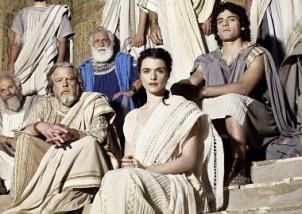
(hypatia13.jpg)
(Orestes sitting behind Hypatia)
The film starts in 391 AD.
By the end of the 4th century A.D., the Roman empire was on the verge of collapse.
Yet Alexandria, in the province of Egypt, still retained much of its splendor.
It boasted one of the seven wonders of the ancient world---the legendary lighthouse.
It was also proud of the greatest library on earth.
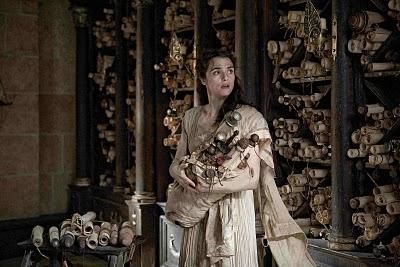
(hypatia17.jpg)
The library was not only a cultural symbol, but also a religious one, a place where the pagans worshipped their ancestral gods.
The city's long-established pagan cult was now challenged by the Jewish faith and a rapidly spreading religion until recently banned: Christianity.
After the storming of the library, many pagans converted to Christianity and Alexandria enjoyed a time of peace.
Hypatia continued her teaching and research, while her former disciples occupied important posts among the social elite.
The Roman empire finally split into two parts.
Many Christians saw this as a sign of the end of the world and decided to prepare themselves by living holier lives.
The story uses historical fiction to highlight the relationship between religion and science amidst the decline of Greco-Roman polytheism and the Christianization of the Roman empire.

(hypatia18.jpg)
Cyril (Sami Samir)
The leader of the Christians, Cyril (Sami Samir), views Hypatia as having too much influence over Orestes and stages a public ceremony intended to force Orestes to subjugate her.
Hypatia's former pupil, Synesius, now the Bishop of Cyrene, comes to her rescue as a religious authority counterweight, but says he cannot help her unless she accepts Christianity; she refuses.
Hypatia makes a personal discovery, theorizing that the Earth orbits around the Sun in an elliptic, not circular, orbit with the Sun at one of the foci.
Cyril convinces a mob of Christians that Hypatia is a witch and they vow to kill her.

(hypatia16.jpg)
Hypatia among the mob
Davus tries to run ahead to warn Hypatia, but she is captured by the mob.
They strip Hypatia naked and are about to skin her alive until Davus persuades the mob otherwise, and they decide to stone her instead.
When everyone goes outside to collect stones, Davus secretly suffocates her to spare her the pain of being stoned to death and tells the mob that she fainted.
Davus leaves as they begin to stone her.
Hypatia's mutilated body was dragged through the streets and burnt on a pyre.
Orestes disappeared, never to be seen again.
Cyril seized power of Alexandria.
Much later, Cyril was declared a saint and doctor of the Church.
Although none of Hypatia's works survived, it is known that she was an outstanding astronomer and renowned for her mathematical studies for her conic curves.
1200 years later, in the 17th century, the astronomer Johannes Kepler discovered that one of these curves, the eclipse, governs the motion of the planets.
It is thought-provoking and quite fascinating!

Kato, how many more DVDs are you gonna borrow?

I'm trying to watch 1,001 movies in the library.
I see... So, the 1,001st movie will be "One Thousand and One Nights (Arabian Nights)," huh?
You're telling me, Diane.
Tell me, Kato, what impressed you most.
Well ... I'd say Pharos---the lighthouse of Alexandria, one of the Seven Wonders.
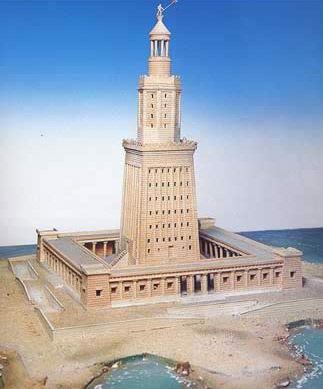
(pharo3.jpg)

And, of course, Library of Alexandria.

The lighthouse and the library ... is that all?

Well ... lastly, not the least important ... Hypatia herself ... Her talent, beauty and the tragic death.

You see, Diane, she is the last philosopher of the Hellenistic Era. Cyril, the leader of the Christians, convinced a mob of Christians to kill her. And her death, I think, actually started the Dark Age in the Christian world.

Why did he want to kill her in the first place?
Well ... I think Cyril viewed Hypatia as a threat to his own dignity and power. He must have understood that she was much smarter than himself.
So, Cyril's inferiority complex and jealousy killed Hypatia. Is that it?
You're telling me, Diane. Cyril was a self-righteous, bigoted and opinionated man---the kind of guy I hate most in the human history.
Kato, you're quite mad with him because he killed the most beautiful woman at the time, aren't you?
No, not really. Actually, I'm speaking on your behalf.
On my behalf?
Yes, I am. If Hypatia had survived, she would have educated more women, some of whom would probably have gone into politics and gained the right to vote.
Do you really think so, Kato?
Yes, very much so. Unfortunately, the Christian mob killed Hypatia, and the coming of other intelligent and politically-powerful women died with her. Women had to wait for 1500 years to obtain the right to vote.
1500 years?
Yes, Hypatia was killed in 415. The American women voted for the first time in 1920. The Japanese women voted in 1946.
Kato, are you a feminist?
Yes, of course, I am.

(laugh16.gif)
【Himiko's Monologue】
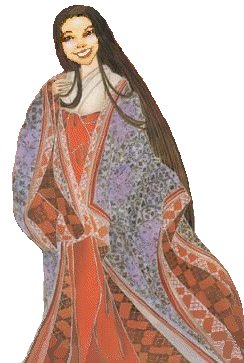
The Seven Wonders of the Ancient World refers to remarkable constructions of classical antiquity listed by various authors in guidebooks popular among the ancient Hellenic tourists, particularly in the 1st and 2nd centuries BC.
The most prominent of these, the versions by Antipater of Sidon and an observer identified as Philo of Byzantium, comprise seven works located around the eastern Mediterranean rim.
The original list inspired innumerable versions through the ages, often listing seven entries.
Of the original Seven Wonders, only the Great Pyramid of Giza (the oldest of the ancient wonders) remains intact.
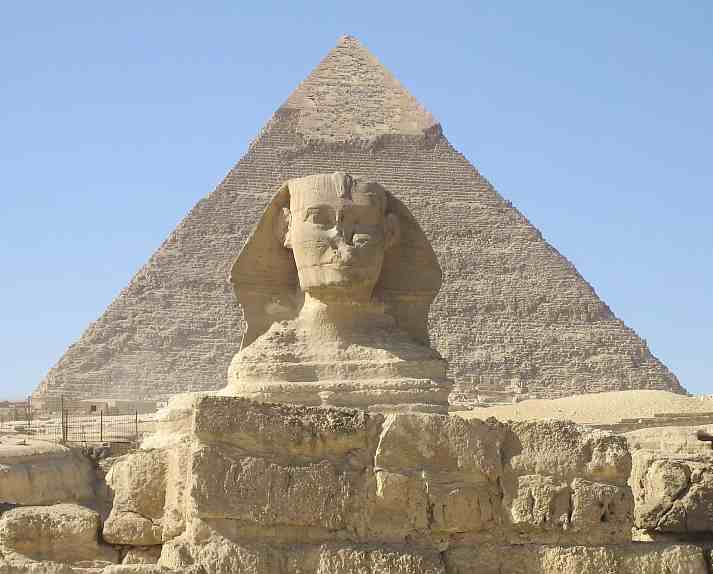
(giza02.jpg)
In any case, I hope Kato will write another interesting article soon.
So please come back to see me.
Have a nice day!
Bye bye ...

(hand.gif)

(renge62e.jpg)
If you've got some time,
Please read one of the following articles:

(sylvie121.jpg)

(juneswim.jpg)

(sylvia16.jpg)
■"First Love"
■"Fright on Flight"
■"Boy's Movie"
■"From Summer to Eternity"
■"Sōseki & Glenn Gould"

(biker302.jpg)
■"Dream Dream Dream"
■"In Search of Your Footprint"
■"Little Night Music"
■"Merry X'mas"
■"Happy New Year!"
■"Long live Diane!"

(vanc700.jpg)
■"Mona Lisa"
■"Flu Shot"
■"Selfish TD Bank"
■"Talk with Mozart"

(chiwawa5.gif)
■Climate of Doubt
■Glory of Death
■Big Mystery
■Hitler and Trump
■Hot October

(surfin2.gif)

(bare02b.gif)
Hi, I'm June Adams.
Woman suffrage is the right of women to vote and to run for office.
Limited voting rights were gained by women in Sweden, Finland and some western U.S. states in the late 19th century.
International organizations were formed to coordinate efforts, especially the International Council of Women (1888) and the International Woman Suffrage Alliance (1904).
In 1893, New Zealand, then a self-governing British colony, granted adult women the right to vote and the self-governing British colony of South Australia did the same in 1895, but also permitted women to run for office.
Australia federated in 1901, and women acquired the right to vote and stand in federal elections from 1902, though uneven restrictions on Aboriginal women voting in national elections were not completely removed until 1962.
The first European country to introduce women's suffrage was the Grand Duchy of Finland, then part of the Russian Empire, which also produced the world's first female members of parliament in the 1907 parliamentary elections.
Norway followed, granting full women's suffrage in 1913.
In most Western countries, women's suffrage came after World War I, with some important late adopters being France in 1944 and Switzerland in 1971.
If Hypatia had survived, women might have gained the right to vote much earlier.

(karuhap8.jpg+bare04e.gif)

(renge730.jpg)

(dogs17.gif)

(girlxx.gif)
















※コメント投稿者のブログIDはブログ作成者のみに通知されます